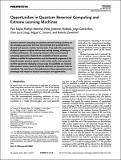Por favor, use este identificador para citar o enlazar a este item:
http://hdl.handle.net/10261/266889COMPARTIR / EXPORTAR:
 SHARE SHARE
 CORE
BASE CORE
BASE
|
|
| Visualizar otros formatos: MARC | Dublin Core | RDF | ORE | MODS | METS | DIDL | DATACITE | |

| Título: | Opportunities in Quantum Reservoir Computing and Extreme Learning Machines |
Autor: | Mujal, Pere CSIC ORCID; Martínez-Peña, Rodrigo CSIC ORCID; Nokkala, Johannes; García Beni, Jorge CSIC ORCID; Giorgi, Gian Luca CSIC ORCID ; Soriano, Miguel C. ; Zambrini, Roberta CSIC ORCID | Fecha de publicación: | ago-2021 | Editor: | John Wiley & Sons | Citación: | Advanced Quantum Technologies 4(8): 2100027 (2021) | Resumen: | Quantum reservoir computing and quantum extreme learning machines are two emerging approaches that have demonstrated their potential both in classical and quantum machine learning tasks. They exploit the quantumness of physical systems combined with an easy training strategy, achieving an excellent performance. The increasing interest in these unconventional computing approaches is fueled by the availability of diverse quantum platforms suitable for implementation and the theoretical progresses in the study of complex quantum systems. In this review article, recent proposals and first experiments displaying a broad range of possibilities are reviewed when quantum inputs, quantum physical substrates and quantum tasks are considered. The main focus is the performance of these approaches, on the advantages with respect to classical counterparts and opportunities. | Versión del editor: | http://dx.doi.org/10.1002/qute.202100027 | URI: | http://hdl.handle.net/10261/266889 | DOI: | 10.1002/qute.202100027 | Identificadores: | doi: 10.1002/qute.202100027 e-issn: 2511-9044 |
| Aparece en las colecciones: | (IFISC) Artículos |
Ficheros en este ítem:
| Fichero | Descripción | Tamaño | Formato | |
|---|---|---|---|---|
| Extreme_Learning_Machines.pdf | 1,31 MB | Adobe PDF |  Visualizar/Abrir |
CORE Recommender
Page view(s)
38
checked on 30-abr-2024
Download(s)
116
checked on 30-abr-2024
Google ScholarTM
Check
Altmetric
Altmetric
Este item está licenciado bajo una Licencia Creative Commons

